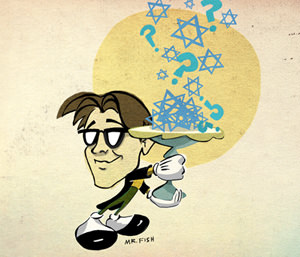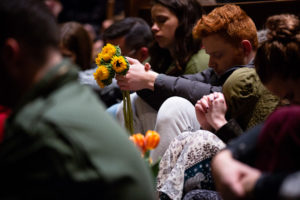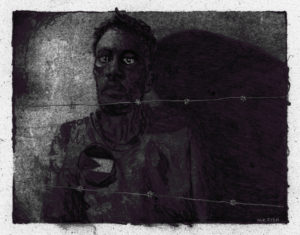When Jewish Upon a Star
The voice on the other end of the telephone needed to make sure that I was 21. I wasn’t. “I’m 22,” I said, lying, figuring that 19 might as well be 22 and, anyway, this was a comedy club that I was scheduling an audition for, not the Moonlite Bunny Ranch or the FBI.Back in the summer of 1982 I asked my mother if we had any Jewish ancestors.
The voice on the other end of the telephone needed to make sure that I was 21. I wasn’t. “I’m 22,” I said, lying, figuring that 19 might as well be 22 and, anyway, this was a comedy club that I was scheduling an audition for, not the Moonlite Bunny Ranch or the FBI.
My heroes at the time were Woody Allen, Jackie Mason, Philip Roth, Neil Simon, Irving Howe, Erich Fromm, Allen Ginsberg, Arthur Miller, Abraham Maslow, S. J. Perelman, Paul Krassner, Abbie Hoffman and Groucho Marx. I’d decided, over the previous 18 months while slowly dripping out of college, that if I was ever going to succeed as a Jewish comedian and writer I needed to stop being a South Jersey Protestant virgin fine arts major at Rutgers University with Han Solo hair and Top-Siders and move to New York to have my inner David Cassidy exorcised from my soul, kneed in the stomach and tossed into a rack of dirty trash cans somewhere in Boro Park or Crown Heights.
My fascination with Judaism began when I was 14, right around the time I decided the tribe that I belonged to — the one with the John Wayne narration, the street address of Downtown Disney: Reality in 3-Quarter Scale Facade! and the bizarre Ameri-Christian logic, call it blatant nepotism, that had cast super-WASP Charlton Heston in the role of Moses — was neither honest nor intellectually curious enough to reflect the truth of existence nor the dark complexities of the human experience.
Judaism, on the other hand, as evidenced by several thousand years of recorded history and vast amounts of art and literature and kvetching, seemed to thrive on a tradition of critical self-analysis as opposed to the self-glorification of Technicolored Anglo-Saxonism. In fact, after a rather intense week over Christmas vacation in which I’d devoured “Der Antichrist” by Friedrich Nietzsche, “The Future of an Illusion” by Sigmund Freud and both “Night” and “The Trial of God” by Elie Wiesel, I suddenly realized that the atheistic evangelism that I so naturally gravitated toward was not only not wholly scientific, but actually found many of its most prominent champions and sympathizers, including Baruch Spinoza, Emma Goldman, Jacques Derrida and Karl Marx, coming from Jewish origins.
Even among theists who practiced the religion, rabbis included, skepticism and rigorous debate seemed to prevent the junking up of Judaism with all the superfluous voodoo and super and subhuman mascots and harrowingly hierarchical idolatry exemplified by other religions, such as Catholicism, Consumer Capitalism and Fascism.
Every day people are straying away from the church and going back to God. — Lenny Bruce
“You know, they’re probably going to have to take some skin off the back of your legs for this,” said my friend, Derek, one day after school while paging through the Yellow Pages in search of a plastic surgeon. I was at his house, as I was most afternoons, drinking a highball glass of NyQuil, which I was doing only because his parents were out and it was almost New Year’s and he was driving. I had been complaining about the size of my nose all day long, saying that I wished I had a bigger one, something more Semitic and less Debbie Reynolds, and he was tired of hearing about it.
“I don’t know why they can’t make one bigger,” I said. “They make boobs bigger, for Chrissake!” Then Derek made the comment about the extra skin. Then I changed my mind.
“Are you sure?” asked Derek. “Don’t you want to be a bigger boob?”
You should have your anti-Semitic head blown off, you fucking piece of dog shit!!!! That was just one of the many suggestions made by one of the people thoughtful enough to email me in January 2009 in response to a cartoon that I’d posted online depicting Holocaust survivors holding up signs in support of the 1,000-plus Palestinians killed during what the Israelis called Operation Cast Lead and what the Arab world called the Gaza Massacre. Who better to speak in solidarity with an oppressed and quarantined and sadistically tortured population, I figured, than another famously and morbidly oppressed and quarantined and sadistically tortured population, the ethnicity of either population being grossly unimportant in the face of their common humanity?
Even my older brother, Jeff, was emailing me, although the subject of his correspondence had less to do with defending the actions of Israel and more to do with the resistance tactics of Hamas, which had been firing hundreds of Qassam rockets into Southern Israel in retaliation against the IDF’s never-ending siege of Gaza — rockets that had killed, from 2000 to 2009, 22 Israelis, prompting me to wonder how devastating the retaliation might’ve been had Hamas been launching corn dogs instead, knowing that heart disease is responsible for killing upward of 600,000 people every year.
Jeff: (via email) I guess this is what we’re seeing, the final, horrible, inexcusable but typical final stages of a war. To quote Gandhi: “I object to violence because when it appears to do good, the good is only temporary; the evil it does is permanent.” Hamas fights on, Israel fights on, the evil it does is permanent.
Dwayne: (via email) I’m not sure I agree with the idea that what’s happening between the Israelis and the Palestinians is the end of a war. Let me bring in some other parallels to consider. Prior to the Stonewall Riots, many in the gay movement felt completely ineffectual and hopeless as a population.
Continuously mistreated and culturally categorized as perverts and, quite literally, seen as being subhuman, gays by and large existed in varying degrees of real misery (depending on the geography) and were forced to perpetuate their own invisibility by remaining subservient to the prejudice that imprisoned them. Returning violence to the police and vice officers galvanized the movement in such a way that could’ve only been achieved through violence — it showed the world that there are genuine consequences for those who, both literally and figuratively, live by the sword.
I don’t celebrate that fact as a virtue, but rather point to it as a truism of physiological physics, a cause and effect as permanent as the truism of gravity. You can will an egg to maintain its integrity with all your might while it’s falling out of your hand, but you won’t be able to change what happens to it once it hits the ground. Likewise, bullies don’t usually possess any great talent for self-reflection and tend to learn of their own dedication to injustice by having injustice mirrored back upon them, if they ever learn. Malcolm X had much the same effect on the black movement as Stonewall had on the gays: No one should be allowed to revel in the delusion that they are so privileged that they can abuse other people and remain exempt from any blowback.
I think of Israel’s “war” with Lebanon in 2006. I think of Vietnam. I think of Iraq. Ultimately, I think, it becomes an issue of personal dignity. Human beings will tend to want to fulfill the fruition promised to them by their own biologies; DNA, in addition to determining eye color and rate of tooth decay, programs us with passions for freedom and comfort and self-determination. What Gandhi and King did was a tactic for rending the whip from the hand of their oppressor, certainly, and one I find exquisitely beautiful and inspiring; however, when I see how lazy and unimaginative and tribal humanity can be I find myself unable to trust that there would be any lasting sorrow over the cruel slaughter of me and my fellow pacifists. History has shown that there would likely be a quiet celebration for the gained real estate, both physically and ideologically, left by my absence.
Really? If the cops had gone crazy and killed all the protesters and none of them fought back, every single American would know about Stonewall instead of the very small % that do now. Further, if they had killed some cops where would the movement be?
So is it just the right amount of violence? My understanding of Stonewall is that it was not particularly an event of violence by gays inflicted on the oppressive police, but more the collection of a critical mass of people, gathered for the same reason, who got beat up by the police and fought back just enough to make it into the newspaper but not enough to demand revenge by generations of cops to come.
Not sure I agree with the mathematics. Seems that you expect not only great lessons to come from well publicized mass slaughter, but lasting ones as well, which history doesn’t bear out. The Armenian holocaust didn’t prevent the Jewish holocaust, nor did the Jewish holocaust teach the lesson to Israel that people should not be forced into ghetto existence and systematically terrorized and ultimately murdered with great technological proficiency.
Also, everybody knows about both World Wars — you can’t get any more public than that — and both of those wars ended with a global promise of “never again.” Some promise. And, yes, there is something to be said for “just the right amount of violence.” I’d rather be shot in the leg than in the head.
Yes! It feels great, especially when it’s justified. Self-defense violence, revenge violence, righteous violence, holy violence. Deep down inside, I still have some programming that would make me feel wonderful if I could shoot a man in a WW II German uniform. Those fuckers! I want to chop the arms off some Rwandan Hutus! I want to laser storm troopers!
You’re forgetting General Ursus from the “Planet of the Apes.” And you’re precisely right about that programming, which I would argue is only slightly tamed by one’s moral integrity. I doubt that a human being’s natural instinct for doing whatever he can to guarantee his personal survival will ever be sublimated by the abstract notion that stepping into the buzz saw of injustice is better for the species.
Back in the summer of 1982 I asked my mother if we had any Jewish ancestors. She was making a grilled cheese sandwich using Velveeta, Land O’Lakes butter and Wonder bread at the time, the question no less crazy than if I’d asked an Eskimo if he had a surfing gene. I was probably wearing the yarmulke that my high school art teacher, Mr. Applebaum, had given to me and holding “Gates of Mitzvah: A Guide to the Jewish Life Cycle” by Simeon J. Maslin, which I’d gotten for Christmas.
“Not by blood,” she said, “but definitely by punch line.” Then she told the parable of Benjamin J. Holtzhacker and the Captive Audience.
When my mother was in the second grade back in 1951, her teacher took some time before winter break to go around the room and ask her students to take turns naming a favorite holiday tradition that they enjoyed with their families. This was in early December and the classroom was done up gaily in silver tinsel and pipe cleaner candy canes and cardboard Santas. Little Billy loved watching a model train circle the base of his Christmas tree while blowing real smoke. Margo felt like a Yuletide queen sitting atop her father’s shoulders while her family caroled with members of their church congregation through the center of town. “How are Christmas trees and black men alike?” asked my mother when it was her turn, momentarily freezing the forward momentum of the class activity.
“I beg your pardon?” said her teacher, trying to fit the non sequitur into a nonexistent slot in her head.
“How are Christmas trees and black men alike?” asked my mother for a second time, her face as bright as a freshly halved onion. Nobody said a word. “They both have colored balls!” shouted my mother, turning to wink at Benjamin J. Holtzhacker who had told her the joke and was hiding his head in the back row. My grandmother was promptly telephoned and my mother was sent home as if she’d suddenly come down with communism and was in danger of infecting the entire school population.
Then, in mid-September of 1982, the Israeli army surrounded the Sabra and Shatila Palestinian refugee camps in Beirut and made it impossible for anybody to leave. Then it gave the green light to the Christian Lebanese Phalangists to enter the camps at night and, beneath the incandescent light cast from a thousand Israeli flares, to massacre upward of 3,000 people inside. Then I decided, for the sake of saving mine and Moses’ and Sid Caesar’s and Lenny Bruce’s and Mort Sahl’s and Noam Chomsky’s and Susan Sontag’s and Gloria Steinem’s and Naomi Klein’s and Sarah Silverman’s people from succumbing to the derogation of a negative stereotype, that the State of Israel and the spiritual integrity of Judaism were two completely different things.
“You don’t look 21,” said Derek, as I was about to get on the train bound for New York, just as the breeze blew back my hair revealing that I’d shaved my hairline back 2 inches from my forehead. “You don’t look any older — you look like somebody who’s lost a bet!”
“It’s a comedy club,” I said, reassuring him, “it’ll be too dark to see how old I am.”
“You’ll be standing in a fucking spotlight, you jackass!” he reminded me, making me recall a quote by Mark Twain.
If God had meant for us to be naked, we’d have been born that way.
Three hours later, I took the stage, squinting hard beneath a light bright enough to suggest interrogation, and did my best to assimilate into the questionable murkiness of my own intentions to find and hold an audience captive.
Your support matters…Independent journalism is under threat and overshadowed by heavily funded mainstream media.
You can help level the playing field. Become a member.
Your tax-deductible contribution keeps us digging beneath the headlines to give you thought-provoking, investigative reporting and analysis that unearths what's really happening- without compromise.
Give today to support our courageous, independent journalists.








You need to be a supporter to comment.
There are currently no responses to this article.
Be the first to respond.